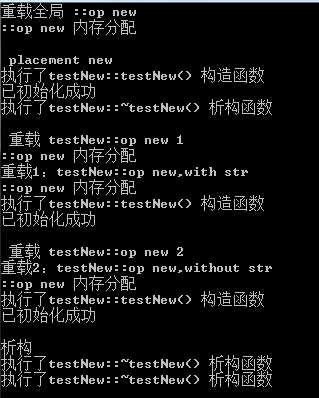c++中的new、operator new和placement new
一、new
- new(也称作new operator),是new 操作符,不可重载
class T{...};
T *t = new T(initial_args_list); //此时的new ,是new 操作符new操作 会执行以下三个步骤
- 调用类的(如果重载了的话)或者全局的operator new分配空间
- 用类型后面列的参数列表来调用构造函数,生成类对象
- 返回对应的指针
二、 operator new
operator new是 operator 函数,与operator +等函数类似,可以被重载,operator new一般在类中进行重载。在全局重载容易造成程序崩溃,因为全局的::operator new 负责整个程序运行期间的堆空间的分配,重载全局::operator new 须慎之又慎!
operator new 在类中重载,完成自定义操作,并调用全局::operator new,返回对应的指针
class T{
...
void* operator new(size_t){
... //自定义操作
return ::operator new(size_t);
}
};三、placement new
是重载operator new 的一个标准、全局的版本
它不能够被自定义的版本代替,即不能重载。它的作用是在已分配的空间中构造对象。
void *operator new( size_t, void * p ) throw() { return p; }Placement new使用步骤
在很多情况下,placement new的使用方法和其他普通的new有所不同。这里提供了它的使用步骤。
- 缓存提前分配
char*buf = (::operator new((size_t)(sizeof(T))));
- 对象的分配,在已分配的缓存中调用构造函数,生成对象
T *t = new(buf)T;
- 使用对象,用-> 访问对象的成员
t->men_func();
- 调用外在的析构函数
t->~T();
- 释放资源
delete [] buf;
使用例子:
#include <stdio.h>
#include <iostream>
#include <string>
#include <malloc.h>
using namespace std;
class testNew{
public:
testNew(){ cout << "执行了testNew::testNew() 构造函数" << endl; }
~testNew(){ cout << "执行了testNew::~testNew() 析构函数" << endl; }
void* operator new(size_t size, string str){
cout << "重载1:testNew::op new," << str << endl;
return ::operator new(size);
}
void* operator new(size_t size){
cout << " 重载2:testNe w::op new,without str" << endl;
return ::operator new(size);
}
void print(){
cout << "已初始化成功" << endl;
}
};
void * operator new(size_t size)
{
cout << "::op new 内存分配 "<< endl;
return malloc(size);
}
int main()
{
cout << "重载全局 ::op new" << endl;
char * buf = (char *)(::operator new((size_t)(sizeof(testNew))));
cout << endl;
cout << " placement new" << endl;
//不加::,会调用 void* testNew:: operator new(size_t size, string str)
//导致不能匹配全局的placement new
testNew *test = ::new (buf)testNew;
test->print();
test->~testNew();
delete []buf;
cout << endl;
cout << " 重载 testNew::op new 1" << endl;
//此时输出有4行
testNew *test2 = new("with str")testNew;
//::op new 内存分配 -> 给const char* "重载"分配堆空间
//重载1:testNew::op new,with str ->调用testNew::op new 1
//::op new 内存分配 ->testNew::op new 1调用 全局的 ::op new
//执行了testNew::testNew() 构造函数
test2->print(); //输出 “已初始化成功” ,表示已正确返回指针
cout << endl;
cout << " 重载 testNew::op new 2" << endl;
testNew *test3 = new testNew;
test3->print(); //输出 “已初始化成功” ,表示已正确返回指针
cout << endl;
cout << "析构" << endl;
delete test2;
delete test3;
getchar();
return 0;
}
?
- 原创所有,转载注明出处,若有错误,欢迎大家指正,共同学习。谢谢!
